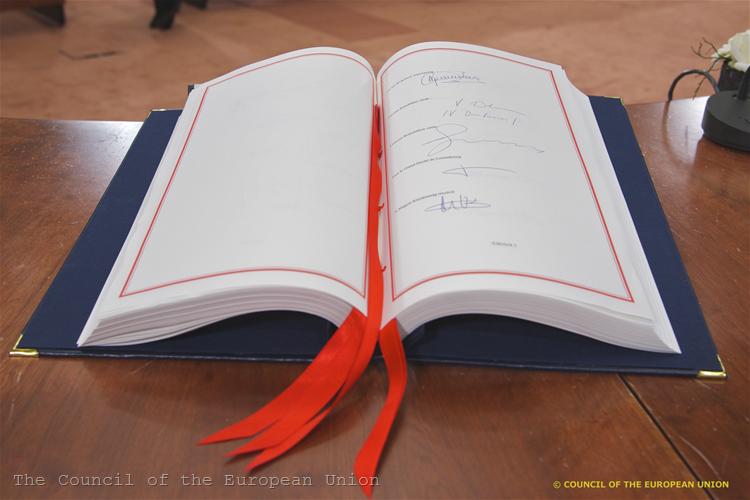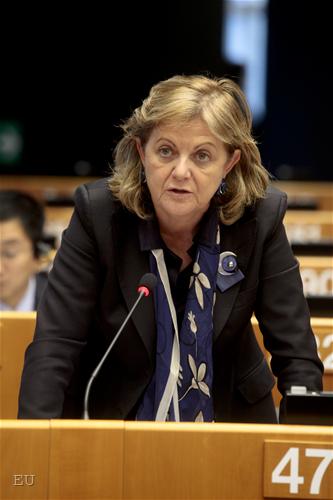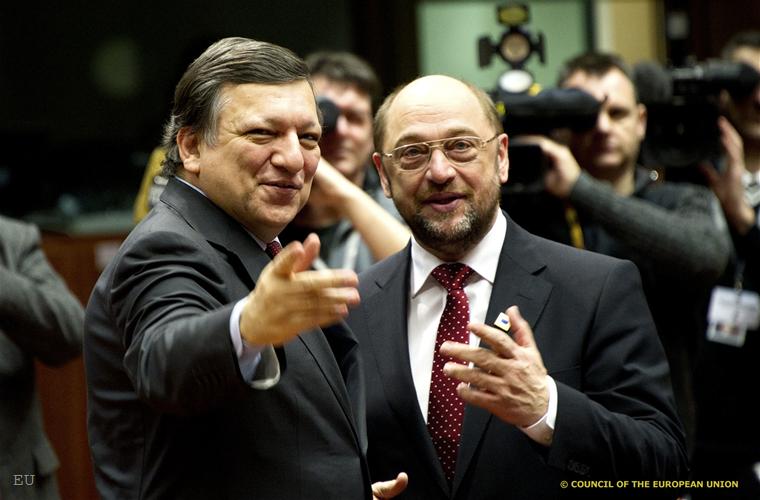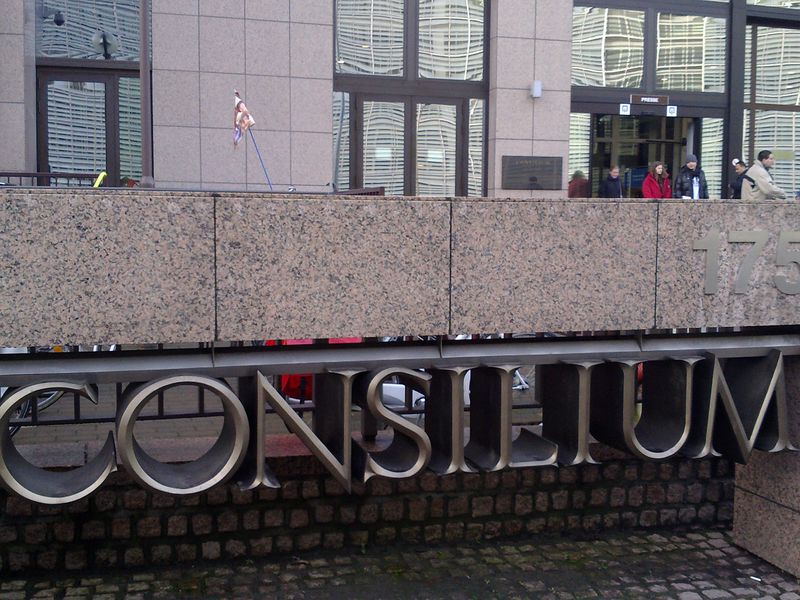The European Parliament Wants to Have a Role in the Fiscal Compact 'Euro Plus'
Evelina Topalova, December 12, 2011
 "Today's crisis in not only an economic crisis, it is also, but perhaps most of all, a crisis of values. This sounds banal, almost like a slogan, but let us try and take this idea seriously.
"Today's crisis in not only an economic crisis, it is also, but perhaps most of all, a crisis of values. This sounds banal, almost like a slogan, but let us try and take this idea seriously.
A leading political theorist said that the market and all economic activities are first of all a moral undertaking, because they require belief in the solidity of another person. Another noticed that the economy is supported by cultural institutions because the agreements are made between people who do not know each other. They need trust, loyalty and responsibility.
Our problem is not primarily a problem of Treaties. It is a problem of economic governance in some countries and a problem of trust among us. Markets do not trust countries. Citizens do not trust politicians. Countries do not trust each other."
With these words, European Parliament President Jerzy Buzek appealed to the EU leaders at the European Council on 9 December. He stressed that the European Parliament's position was that all decisions should be taken within the EU "now or in the nearest possible future." From the comments of Mr Buzek before the media it became clear that he accepted the decision of the Member States to resort to an intergovernmental agreement because they had no choice but he called an option to be found agreements to be introduced into the European legislative framework and the European institutions to be included in the process:
"We are against any creation of new divisions among Member States. We cannot accept that one or two countries that have doubts about integration will draw us into a permanent division. If some countries refuse to decisively strengthen the rules for the eurozone, we can also do this within existing treaties via enhanced cooperation using Article 20 of the Treaty on European Union. [...] What is crucial is that this is a solution within the existing treaty framework and open to all member states, and involving the EU institutions."
Parliament still believes that if it comes to Treaty changes there must be a Convention which, according to Mr Buzek, will not take six months but six weeks, provided that there are "the mandate and the good will of all parties." The European Parliament should be involved in these debates because "when deciding about the future of Europe, we need to gain support of our citizens. If you want to strengthen fiscal rules and give greater power to a supranational body - you really need this support. There can be no short-cut with democracy on such a decisive matter."
President Buzek did not limit himself to the specific changes, related to economic governance, and proposed a change of the approach in selecting the commissioners to give greater legitimacy to the Commission. Moreover, without the need for contractual changes, says Buzek. "I believe that the next European Commission should be drawn from members elected to the European Parliament. After the hearings organised by our Committees, the College can be elected by MEPs. This would give a double legitimacy - a direct one to national electors, and a European one to the Parliament."
The reactions of the main political groups in the European Parliament to the fiscal compact agreed by 23 EU countries were fully expected, ranging from complete approval to complete rejection in the direction from right to left. However, all called on Parliament to get its due role. The presidents of the European Council and the Commission also stated unequivocally that the Parliament will be associated in the process.
The president of the largest group in the EP, the European People's Party, Joseph  Daul (France) said: "My Group will work with the European Council and the European Commission to ensure the rapid implementation of the agreement, while ensuring that the European institutions fully play their role as guarantors of European interests. The European Parliament in particular should see its role of ensuring the democratic legitimacy of the new Treaty guaranteed."
Daul (France) said: "My Group will work with the European Council and the European Commission to ensure the rapid implementation of the agreement, while ensuring that the European institutions fully play their role as guarantors of European interests. The European Parliament in particular should see its role of ensuring the democratic legitimacy of the new Treaty guaranteed."
 Liberal leader Guy Verhofstadt (Belgium) commented that the new treaty would be "only acceptable if the community method and democratic control are fully respected.” According to him, however, the agreement itself is not sufficient to solve immediately the debt crisis. Although he defined the introduction of a balanced budget rule as a positive step, Guy Verhofstadt criticised the leaders: "There is no mention of a banking licence for enhanced ECB intervention, nor of a eurobond market or a collective redemption fund to bring down excessive debt.” According to the liberal leader, "this is still not the economic and fiscal union we need."
Liberal leader Guy Verhofstadt (Belgium) commented that the new treaty would be "only acceptable if the community method and democratic control are fully respected.” According to him, however, the agreement itself is not sufficient to solve immediately the debt crisis. Although he defined the introduction of a balanced budget rule as a positive step, Guy Verhofstadt criticised the leaders: "There is no mention of a banking licence for enhanced ECB intervention, nor of a eurobond market or a collective redemption fund to bring down excessive debt.” According to the liberal leader, "this is still not the economic and fiscal union we need."
Liberal MEP Andrew Duff (UK), spokesman on constitutional affairs,  commented that the formation of a 'EU 2' and the prospect of a new treaty should start the process of stabilising the markets and saving the euro. However, he warned that "there must be no question that EU2 can be cast in a neo-Gaullist mould in which the Commission would be sub-contracted to do secretarial services for the euro-summits. The Commission must remain the motor of government."
commented that the formation of a 'EU 2' and the prospect of a new treaty should start the process of stabilising the markets and saving the euro. However, he warned that "there must be no question that EU2 can be cast in a neo-Gaullist mould in which the Commission would be sub-contracted to do secretarial services for the euro-summits. The Commission must remain the motor of government."
The British MEP made an interesting commentary on the position of his own country, moreover, Andrew Duff is a representative of the Liberal Democrats - the junior coalition partner of Cameron's Conservatives in the government. "Mr Cameron has reached the logical conclusion of Tory policy which is to retire Britain to a second class membership of Europe. This will be hugely damaging to the British national interest, including the interests of the City of London which the prime minister purports to wish to advance."
 Just the opposite was the reaction of the European Conservatives and Reformists. Group's chairman Jan Zahradil (the Czech Republic) congratulated the prime ministers of the UK and the Czech Republic that "in a difficult atmosphere they defended the interests of their citizens and their constituents." According to the ECR group, "to surrender fiscal sovereignty without any consideration would have been unacceptable." "The leaders of the euro zone unfortunately missed the opportunity to transform the EU into a flexible, open structure, insisting instead on a narrow-minded and obsolete federalist concept, which leads the EU only in one direction: that of ever-closer integration."
Just the opposite was the reaction of the European Conservatives and Reformists. Group's chairman Jan Zahradil (the Czech Republic) congratulated the prime ministers of the UK and the Czech Republic that "in a difficult atmosphere they defended the interests of their citizens and their constituents." According to the ECR group, "to surrender fiscal sovereignty without any consideration would have been unacceptable." "The leaders of the euro zone unfortunately missed the opportunity to transform the EU into a flexible, open structure, insisting instead on a narrow-minded and obsolete federalist concept, which leads the EU only in one direction: that of ever-closer integration."
The co-presidents of the Greens/EFA Group Rebecca Harms and Daniel Cohn-Bendit also criticised the leaders that their meeting was a fiasco in terms of dealing with the debt crisis. According to them, “relying on the IMF as a backstop is the ultimate symptom of the failure to deliver an EU response”. The Greens stated that ”supporting the ECB to back-up the Euro, granting the EFSF-ESM a banking license, with a view to ultimately creating a system of Eurobonds, is the only path that will draw a line under the crisis once-and-for-all.”
On Tuesday, 13 December, the European Parliament will discuss the results of the EU summit together with the European Council president, Herman Van Rompuy.
 | © The Council of the European Union
| © The Council of the European Union Klaus Regling | © Council of the EU
Klaus Regling | © Council of the EU Mario Centeno | © Council of the EU
Mario Centeno | © Council of the EU Mario Centeno | © Council of the EU
Mario Centeno | © Council of the EU | © European Parliament
| © European Parliament | © The Council of the European Union
| © The Council of the European Union | © European Parliament
| © European Parliament | © EU
| © EU | © EU
| © EU | © euinside
| © euinside